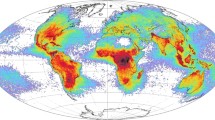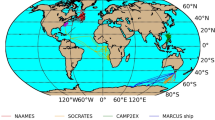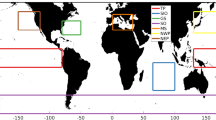Abstract
The data from OSO-5 confirm the OSO-2 result that storm complexes at night are chiefly found over land. The North Atlantic Ocean seems to have more lightning storms associated with it than other regions of ocean whereas the principal desert regions display a marked scarcity.
This is a preview of subscription content, access via your institution
Access options
Subscribe to this journal
Receive 51 print issues and online access
$199.00 per year
only $3.90 per issue
Buy this article
- Purchase on Springer Link
- Instant access to full article PDF
Prices may be subject to local taxes which are calculated during checkout
Similar content being viewed by others
References
Vorpahl, J. A., Sparrow, J. G., and Ney, E. P., Science, 169, 860 (1970).
Schonland, B., The Flight of Thunderbolts (Clarendon Press, Oxford, 1964).
Ney, E. P., Nature, 183, 451 (1959).
Markson, R., Pure Appl. Geophys., 84, 161 (1971).
Brooks, C. E. P., Quart. J. Roy. Meteor. Soc., 60, 153 (1934).
Lakshminarayan, K. N., J. Sci. Indust. Res., 21 D, 228 (1962).
Dennis, A. S., J. Atmos. Sci., 27, 170 (1970).
Author information
Authors and Affiliations
Rights and permissions
About this article
Cite this article
SPARROW, J., NEY, E. Lightning Observations by Satellite. Nature 232, 540–541 (1971). https://doi.org/10.1038/232540a0
Received:
Issue Date:
DOI: https://doi.org/10.1038/232540a0
This article is cited by
-
Lightning detection on Venus: a critical review
Progress in Earth and Planetary Science (2018)
-
Solar modulation of atmospheric electrification and possible implications for the Sun–weather relationship
Nature (1978)
-
Discussion of the fundamental problem of atmospheric electricity
Pure and Applied Geophysics PAGEOPH (1972)
Comments
By submitting a comment you agree to abide by our Terms and Community Guidelines. If you find something abusive or that does not comply with our terms or guidelines please flag it as inappropriate.



